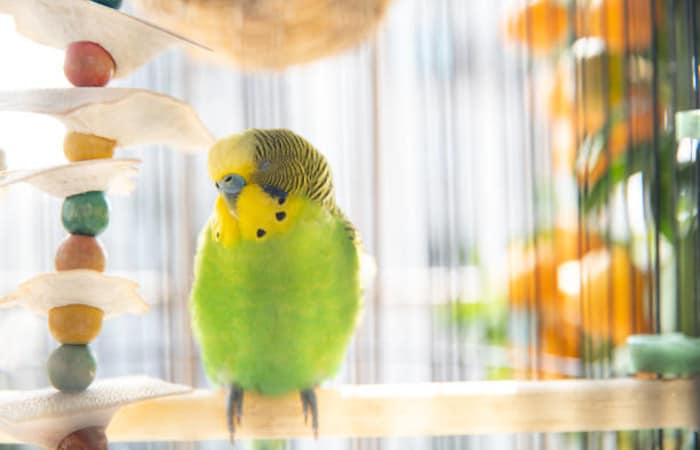Do you know what your budgie is trying to tell you when it sleeps in a certain position?
There are 7 common budgie sleeping positions and their meanings are important to parrot owners.
In this blog post, we will discuss each of these positions and what they mean. Keep in mind that every bird is different, so your budgie’s sleep position may not mean the same thing as another bird’s sleep position.
But if you are curious about what your budgie might be trying to say, read on!
How do budgies sleep in a cage?
Budgies sleep in a cage by finding a comfortable perch and resting their head on their folded wings.
Budgies are active birds and typically sleep for short periods of time (5-10 minutes) throughout the day.
They usually sleep on one foot with their head tucked under their wing. This allows them to stay vigilant and aware of their surroundings while they rest.
How long do budgies sleep?
Budgies generally sleep around 10-12 hours a day, but this can vary somewhat depending on the individual bird and the time of year.
Some budgies may sleep a bit more during the winter months, while others may sleep less during the summer when the days are longer.
It’s important to make sure your budgie has a dark, quiet place to sleep in at night, as this will help them get the rest they need.
If you’re not sure how much your budgie is sleeping, you can always ask your veterinarian for advice.
You may also like: Why Is My Budgie Sleeping So Much? Should I Be Worried
7 common budgie sleeping positions and their meanings
There are many different sleeping positions for budgies and each position has its meaning behind. Here are the 7 common sleeping positions and their meanings that your budgie is telling you.
Budgies sleeping on one leg
There are a few different reasons why budgies might sleep on one leg.
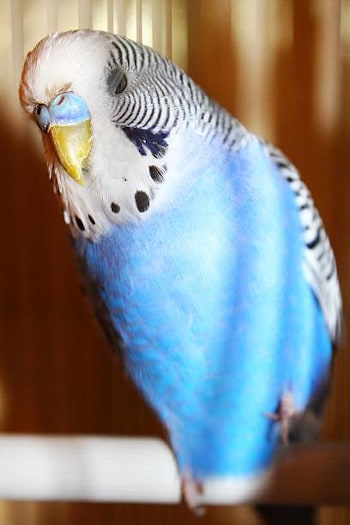
One possibility is that they’re keeping their body temperature regulated.
When birds sleep, they often tuck one wing under their body and curl their other leg up against their chest, which can help to keep them warm.
Another possibility is that they’re using the leg as a counterbalance.
When budgies sleep on one side, they can sometimes roll over onto their back.
If they do this while they’re asleep, they could easily fall over and hurt themselves.
Sleeping on one leg helps to keep them stable and prevents them from rolling over in their sleep.
Budgies tucking head under feathers
There is likely a combination of factors why budgies bury their head under feathers when sleeping.
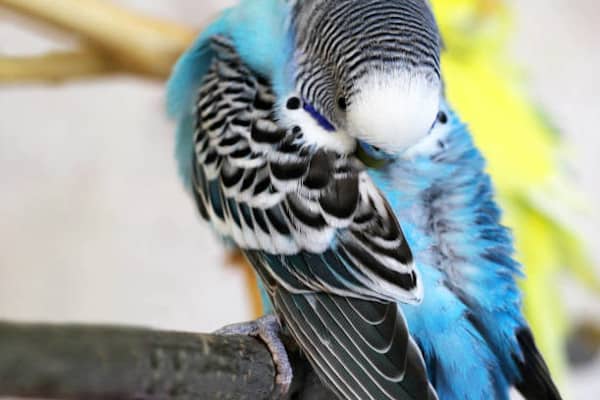
One possibility is that they are trying to create a warmer environment for themselves.
Another possibility is that they are doing it in order to increase their level of comfort.
It’s possible that they find the sensation of having their head buried under their feathers to be pleasurable, or that it helps them to relax and fall asleep more easily.
Whatever the reason may be, it’s clear that this behavior is normal and healthy for budgies, so there’s no need to worry if you notice your bird doing it occasionally.
Budgies lying down on perch
When a budgie is sleeping, it will usually lie down on its perch with its eyes closed. It means the budgie is relaxed and comfortable.
By keeping their feet off the ground and close to their bodies, they are able to minimize heat loss and better retain body heat. This is particularly important in cold weather or when the bird is sick.
Additionally, lying down on the perch may help the budgie feel more secure. Some budgies will sleep with their heads tucked under their wings, while others will sleep with their heads resting on the top of the perch.
Budgies sleeping on the bottom of the cage
There can be a few reasons why your budgie has taken to sleeping on the bottom of its cage.
One possibility is that they feel tired or bloated and need to stretch out their belly.
Another possibility is that they are experiencing joint pain and find it more comfortable to sleep on a flat surface.
Finally, it could simply be that your budgie enjoys the cooler temperature at the bottom of the cage.
If you notice that your budgie is lethargic or not eating as much as usual, then it’s important to take them to the vet for a check-up just in case there is an underlying health issue causing these changes in behavior.
However, if your budgie seems healthy and happy, then there’s no need to worry about this sleeping position.
Budgies sleeping on side of the cage
There are a few reasons why your budgie might choose to sleep on the side of its cage.
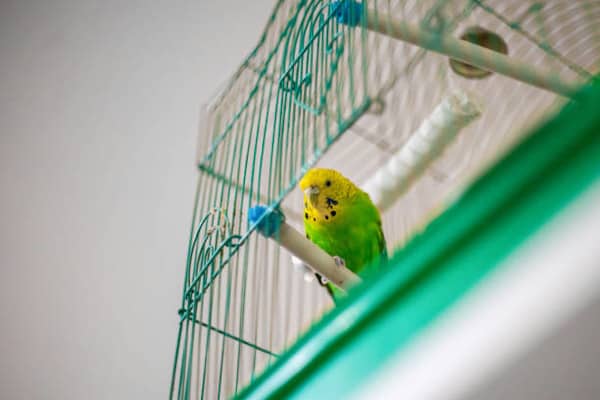
One possibility is that they are trying to stay warm.
The side of the cage is usually closer to the heat source, so it can be a good place for your budgie to stay warm.
Another possibility is that they are trying to get away from the light.
If the side of the cage is closer to a window, it can provide your budgie with some relief from the bright light outside.
Finally, it could simply be that your budgie prefers to sleep in a more enclosed space.
If you notice that your budgie is sleeping on the side of its cage more often than usual, it’s important to make sure that they have access to a heat source and that the light levels in their cage are not too bright.
If everything seems normal, then there’s no need to worry about this sleeping position.
Budgies sleeping with one eye opened
There are a few reasons why your budgie might be sleeping with one eye open.
First, budgies can peek into the risky environment by opening one eye intermittently and keeping half of the brain active.
Your budgie might sleep with one eye open because it is nervous or scared. If your budgie feels like it is in danger, it will try to keep watching for any potential threats.
Secondly, some budgies simply prefer to sleep with one eye open! This could be due to genetics or simply personal preference. If your budgie seems healthy and happy, there’s no need to worry about this sleeping position.
Finally, it could be due to illness or injury. If your budgie is sick or injured, it will often sleep with one eye open in order to keep an eye on its surroundings and be ready to defend itself if necessary.
Budgies sleeping in their food bowl
There are a few reasons why your budgie might be sleeping in its food bowl.
One possibility is that the bowl is closer to the heat source, so it can be a good place for your budgie to stay warm.
Another possibility is that the bowl is a more enclosed space, which your budgie may prefer.
Finally, it could simply be that your budgie enjoys the comfort of sleeping in its food bowl.
If your budgie seems healthy and happy, then there’s no need to worry about this sleeping position.
You may also like: Why Do Cockatiels Sit In Their Food Bowls? Are They Hungry?
How to know if a budgie is sleeping?
There are a few indications that a budgie is sleeping.
One is that they will usually tuck their head under one of their wings.
Additionally, you may notice that their breathing slows and becomes more shallow, and sometimes they might even let out a little snore.
Lastly, if you watch them closely you might be able to see the occasional eye twitch which is often associated with REM sleep.
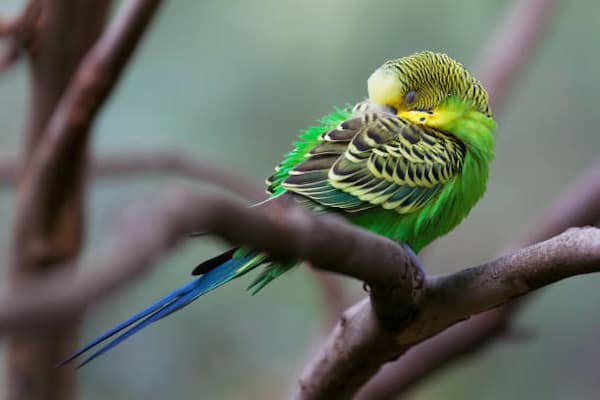
While budgies may spend a good chunk of the day sleeping, they are not necessarily asleep all the time.
You may also like: Why Do Parrots Bob Their Heads To Music? How To Train Them?
Are budgies easy to wake up?
Yes, budgies are easy to wake up.
They usually come awake gradually as light enters the room and they become more alert.
If a budgie is fully asleep and you need to get him up for some reason, you can try gently clapping your hands or making other loud noises near the cage.
Another way to get a budgie’s attention is to offer him a treat. Budgies usually wake up pretty quickly when they hear food being offered.
Conclusion
Budgies are interesting creatures and there is a lot to learn about their sleeping habits.
By understanding the different positions that budgies sleep in, you can get a better sense of what they are trying to communicate.
Most of the time, there is nothing to worry about if your budgie is sleeping in a strange position.
However, if you notice that your budgie is sleeping in the same position all the time or if they seem to be struggling to sleep, it’s important to take them to the vet for a check-up.
